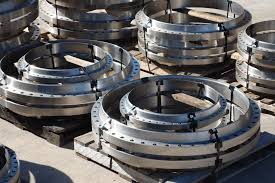Flanges play a vital role in piping systems—serving as connection points for pipes, valves, pumps, and other equipment. While their design is critical, the material from which a flange is made is equally important. The choice of material affects the flange’s strength, corrosion resistance, temperature tolerance, and suitability for specific media and environments.
Different industries operate under unique conditions, and understanding the common flange materials can help ensure long-term performance and safety. Let’s explore the most widely used flange materials and their applications across key sectors.
- Carbon Steel Flanges
Properties:
- Strong and durable
- Cost-effective
- Suitable for moderate temperatures and pressures
Applications: Carbon steel flanges are commonly used in oil & gas, water supply, and HVAC systems. Their affordability and mechanical strength make them ideal for large-scale projects. However, they require proper coatings or galvanization to prevent corrosion, especially in moist or chemical environments.
Industries: Oil & Gas, Water Treatment, Construction, Power Generation
Properties:
- Excellent corrosion resistance
- Good strength at high temperatures
- Long service life
Applications: Stainless steel flanges are widely used in chemical processing, pharmaceuticals, and food & beverage industries, where hygiene and resistance to corrosive substances are essential. Grades like 304 and 316 stainless steel are especially popular due to their resistance to acids, alkalis, and chlorides.
Industries: Food & Beverage, Pharmaceuticals, Chemical, Petrochemical, Marine
- Alloy Steel Flanges
Properties:
- High strength and toughness
- Superior resistance to heat, pressure, and wear
- Often used in high-stress environments
Applications: These flanges are typically used in high-pressure and high-temperature applications, such as steam lines and thermal power plants. Common alloys include Chrome-Moly (Cr-Mo), which withstands thermal stress and is ideal for elevated temperature environments.
Industries: Power Plants, Refineries, Aerospace, Heavy Engineering
- Duplex and Super Duplex Stainless Steel Flanges
Properties:
- Combines high strength with exceptional corrosion resistance
- Resistant to stress corrosion cracking
Applications: Used in offshore platforms, desalination plants, and chemical tanks, duplex flanges are suitable for environments where chloride-induced corrosion is a concern. Their higher strength also allows for weight reduction in large systems.
Industries: Offshore Oil & Gas, Desalination, Chemical Processing
- Copper-Nickel Flanges
Properties:
- Excellent resistance to seawater corrosion
- Non-magnetic and highly durable
Applications: These flanges are preferred in marine and naval applications, especially for seawater piping systems. They are also used in heat exchangers and condenser systems.
Industries: Marine, Shipbuilding, Naval Defense, Coastal Power Stations
- Plastic (PVC, CPVC, PP) Flanges
Properties:
- Lightweight and corrosion-resistant
- Non-conductive and cost-effective
Applications: Plastic flanges are used in low-pressure and low-temperature applications, especially where corrosive chemicals are involved. Common in wastewater treatment and chemical dosing systems, they offer good resistance to a wide range of chemicals.
Industries: Water Treatment, Chemical Dosing, Agriculture, Labs
Conclusion: Match Material to Application
Choosing the right flange material is essential for the safety, efficiency, and longevity of any piping system. From high-strength alloy flanges in power plants to corrosion-resistant stainless steel in pharmaceuticals, each material serves a specific purpose. By understanding your project’s requirements and environmental conditions, you can ensure the best material selection for optimal performance.
Whether you’re building for land or sea, heat or chemicals—there’s a flange material for every challenge.

